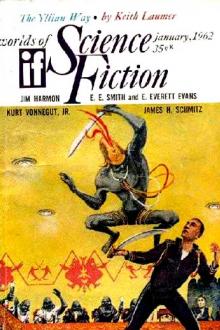Bat Wing, Sax Rohmer [top 20 books to read .txt] 📗

- Author: Sax Rohmer
Book online «Bat Wing, Sax Rohmer [top 20 books to read .txt] 📗». Author Sax Rohmer
“For instance, I have a friend who is good enough sometimes to record my movements. So had Dupin. I smoke a pipe. So did Dupin. I investigate crime, and I am sometimes successful. Here I differ from Dupin. Dupin was always successful. But my argument is this—you complain that the life of Colonel Don Juan Sarmiento Menendez, on his own showing, has been at least as romantic as his name. It would not be accounted romantic by the adventurous, Knox; it is only romantic to the prosaic mind. In the same way his name is only unusual to our English ears. In Spain it would pass unnoticed.”
“I see your point,” I said, grudgingly; “but think of I Voodoo in the Surrey Hills.”
“I am thinking of it, Knox, and it affords me much delight to think of it. You have placed your finger I upon the very point I was endeavouring to make. Voodoo in the Surrey Hills! Quite so. Voodoo in some island of the Caribbean Seas, yes, but Voodoo in the Surrey Hills, no. Yet, my dear fellow, there is a regular steamer service between South America and England. Or one may embark at Liverpool and disembark in the Spanish Main. Why, then, may not one embark in the West Indies and disembark at Liverpool? This granted, you will also grant that from Liverpool to Surrey is a feasible journey. Why, then, should you exclaim, ‘but Voodoo in the Surrey Hills!’ You would be surprised to meet an Esquimaux in the Strand, but there is no reason why an Esquimaux should not visit the Strand. In short, the most annoying thing about fact is its resemblance to fiction. I am looking forward to the day, Knox, when I can retire from my present fictitious profession and become a recognized member of the community; such as a press agent, a theatrical manager, or some other dealer in Fact!”
He burst out laughing, and reaching over to a side-table refilled my glass and his own.
“There lies the wing of a Vampire Bat,” he said, pointing, “in Chancery Lane. It is impossible. Yet,” he raised his glass, “‘Pussyfoot’ Johnson has visited Scotland, the home of Whisky!”
We were silent for a while, whilst I considered his remarks.
“The conclusion to which I have come,” declared Harley, “is that nothing is so strange as the commonplace. A rod and line, a boat, a luncheon hamper, a jar of good ale, and the peculiar peace of a Norfolk river—these joys I willingly curtail in favour of the unknown things which await us at Cray’s Folly. Remember, Knox,” he stared at me queerly, “Wednesday is the night of the full moon.”
CHAPTER IV. CRAY’S FOLLY
Paul Harley lay back upon the cushions and glanced at me with a quizzical smile. The big, up-to-date car which Colonel Menendez had placed at our disposal was surmounting a steep Surrey lane as though no gradient had existed.
“Some engine!” he said, approvingly.
I nodded in agreement, but felt disinclined for conversation, being absorbed in watching the characteristically English scenery. This, indeed, was very beautiful. The lane along which we were speeding was narrow, winding, and over-arched by trees. Here and there sunlight penetrated to spread a golden carpet before us, but for the most part the way lay in cool and grateful shadow.
On one side a wooded slope hemmed us in blackly, on the other lay dell after dell down into the cradle of the valley. It was a poetic corner of England, and I thought it almost unbelievable that London was only some twenty miles behind. A fit place this for elves and fairies to survive, a spot in which the presence of a modern automobile seemed a desecration. Higher we mounted and higher, the engine running strongly and smoothly; then, presently, we were out upon a narrow open road with the crescent of the hills sweeping away on the right and dense woods dipping valleyward to the left and behind us.
The chauffeur turned, and, meeting my glance:
“Cray’s Folly, sir,” he said.
He jerked his hand in the direction of a square, gray-stone tower somewhat resembling a campanile, which uprose from a distant clump of woods cresting a greater eminence.
“Ah,” murmured Harley, “the famous tower.”
Following the departure of the Colonel on the previous evening, he had looked up Cray’s Folly and had found it to be one of a series of houses erected by the eccentric and wealthy man whose name it bore. He had had a mania for building houses with towers, in which his rival—and contemporary—had been William Beckford, the author of “Vathek,” a work which for some obscure reason has survived as well as two of the three towers erected by its writer.
I became conscious of a keen sense of anticipation. In this, I think, the figure of Miss Val Beverley played a leading part. There was something pathetic in the presence of this lonely English girl in so singular a household; for if the menage at Cray’s Folly should prove half so strange as Colonel Menendez had led us to believe, then truly we were about to find ourselves amid unusual people.
Presently the road inclined southward somewhat and we entered the fringe of the trees. I noticed one or two very ancient cottages, but no trace of the modern builder. This was a fragment of real Old England, and I was not sorry when presently we lost sight of the square tower; for amidst such scenery it was an anomaly and a rebuke.
What Paul Harley’s thoughts may have been I cannot say, but he preserved an unbroken silence up to the very moment that we came to the gate lodge.
The gates were monstrosities of elaborate iron scrollwork, craftsmanship clever enough in its way, but of an ornate kind more in keeping with the orange trees of the South than with this wooded Surrey countryside.
A very surly-looking girl, quite obviously un-English (a daughter of Pedro, the butler, I learned later), opened the gates, and we entered upon a winding drive literally tunnelled through the trees. Of the house we had never a glimpse until we were right under its walls, nor should I have known that we were come to the main entrance if the car had not stopped.
“Looks like a monastery,” muttered Harley.
Indeed that part of the building—the north front—which was visible from this point had a strangely monastic appearance, being built of solid gray blocks and boasting only a few small, heavily barred windows. The eccentricity of the Victorian gentleman who had expended thousands of pounds upon erecting this house was only equalled, I thought, by that of Colonel Menendez, who had chosen it for a home. An out-jutting wing shut us in on the west, and to the east the prospect was closed by the tallest and most densely grown box hedge I had ever seen, trimmed most perfectly





Comments (0)